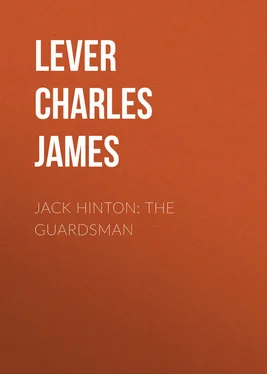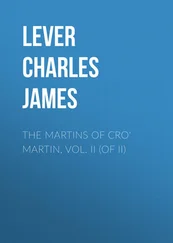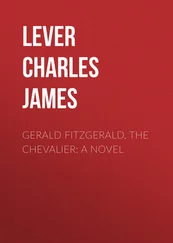Charles Lever - Jack Hinton - The Guardsman
Здесь есть возможность читать онлайн «Charles Lever - Jack Hinton - The Guardsman» — ознакомительный отрывок электронной книги совершенно бесплатно, а после прочтения отрывка купить полную версию. В некоторых случаях можно слушать аудио, скачать через торрент в формате fb2 и присутствует краткое содержание. Жанр: literature_19, foreign_antique, foreign_prose, на английском языке. Описание произведения, (предисловие) а так же отзывы посетителей доступны на портале библиотеки ЛибКат.
- Название:Jack Hinton: The Guardsman
- Автор:
- Жанр:
- Год:неизвестен
- ISBN:нет данных
- Рейтинг книги:5 / 5. Голосов: 1
-
Избранное:Добавить в избранное
- Отзывы:
-
Ваша оценка:
- 100
- 1
- 2
- 3
- 4
- 5
Jack Hinton: The Guardsman: краткое содержание, описание и аннотация
Предлагаем к чтению аннотацию, описание, краткое содержание или предисловие (зависит от того, что написал сам автор книги «Jack Hinton: The Guardsman»). Если вы не нашли необходимую информацию о книге — напишите в комментариях, мы постараемся отыскать её.
Jack Hinton: The Guardsman — читать онлайн ознакомительный отрывок
Ниже представлен текст книги, разбитый по страницам. Система сохранения места последней прочитанной страницы, позволяет с удобством читать онлайн бесплатно книгу «Jack Hinton: The Guardsman», без необходимости каждый раз заново искать на чём Вы остановились. Поставьте закладку, и сможете в любой момент перейти на страницу, на которой закончили чтение.
Интервал:
Закладка:
‘Ah, my dear! – the Lord forgive me! I mean your grace.’
‘I shall never forgive you, Mrs. Rooney, if you change the epithet.’
‘Ah, your grace’s worship, them was fine times; and the husband of an O’Toole, in them days, spent more of his time harrying the country with his troops at his back, than driving about in an old gig full of writs and latitats, with a process-server behind him.’
Had Mr. Rooney, who at that moment was carving a hare in total ignorance of his wife’s sarcasm, only heard the speech, the chances are ten to one he would have figured in a steel breastplate and an iron head-piece before the week was over. I was unable to hear more of the conversation, notwithstanding my great wish to do so, as a movement of those next the door implied that a large instalment of the guests who had not supped would wait no longer, but were about to make what Mr. Rooney called a forcible entry on a summary process, and eject the tenant in possession.
We accordingly rose, and all (save the party around the viceroy) along with us, once more to visit the ball-room, where already dancing had begun. While I was eagerly endeavouring to persuade Miss Bellew that there was no cause or just impediment to prevent her dancing the next set with me, Lord Dudley de Vere lounged affectedly forward, and mumbled out some broken indistinct phrases, in which the word da-ance was alone audible. Miss Bellew coloured slightly, turned her eyes towards me, curtsied, took his arm, and the next moment was lost amid the crowd.
I am not aware of any readier method of forming a notion of perpetual motion than watching the performance of Sir Roger de Coverley at an evening party in Dublin. It seems to be a point of honour never to give in; and thus the same complicated figures, the same mystic movements that you see in the beginning, continue to succeed each other in a never-ending series. You endeavour in vain to detect the plan, to unravel the tangled web of this strange ceremony; but somehow it would seem as if the whole thing was completely discretionary with the dancers, there being only one point of agreement among them, which is, whenever blown out of breath, to join in a vigorous hands-round; and, the motion being confined to a shuffling of the feet, and a shaking of the elbows, little fatigue is incurred. To this succeeds a capering forward movement of a gentleman, which seemingly magnetises an opposite lady to a similar exhibition; then, after seizing each other rapturously by the hands, they separate to run the gauntlet in and out down the whole line of dancers, to meet at the bottom, when, apparently reconciled, they once more embrace. What follows, the devil himself may tell. As for me, I heard only laughing, tittering, now and then a slight scream, and a cry of ‘Behave, Mr. Murphy!’ etc.; but the movements themselves were conic sections to me, and I closed my eyes as I sat alone in my corner, and courted sleep as a short oblivion to the scene. Unfortunately I succeeded; for, wild and singular as the gestures, the looks, and the voices were before, they now became to my dreaming senses something too terrible. I thought myself in the centre of some hobgoblin orgie, where demons, male and female, were performing their fantastic antics around me, grinning hideously, and uttering cries of menacing import. Tarn O’Shanter’s vision was a respectable tea-party of Glasgow matrons compared to my imaginings; for so distorted were the pictures of my brain, that the leader of the band, a peaceable-looking old man in shorts and spectacles, seemed to me like a grim-visaged imp, who flourished his tail across the strings of his instrument in lieu of a bow.
I must confess that the dancers, without any wish on my part to detract from their efforts, had not the entire merit of this transmutation. Fatigue, for the hour was late, chagrin at being robbed of my partner, added to the heat and the crowd, had all their share in the mystification. Besides, if I must confess it, Mr. Rooney’s champagne was strong. My friend O’Grady, however, seemed but little of my opinion; for, like the master-spirit of the scene, he seemed to direct every movement and dictate every change – no touch of fatigue, no semblance of exhaustion about him. On the contrary, as the hour grew later, and the pale grey of morning began to mingle with the glare of wax-lights, the vigour of his performance only increased, and several new steps were displayed, which, like a prudent general, he seemed to have kept in reserve for the end of the engagement. And what a sad thing is a ball as it draws towards the close! What an emblem of life at a similar period!
How much freshness has faded! how much of beauty has passed away! how many illusions are dissipated! how many dreams the lamplight and chalk floors have called into life fly like spirits with the first beam of sunlight! The eye of proud bearing is humbled now; the cheek, whose downy softness no painter could have copied, looks pale, and wan, and haggard; the beaming looks, the graceful bearing, the elastic step, where are they? Only to be found where youth – bright, joyous, and elastic youth-unites itself to beauty.
Such were my thoughts as the dancers flew past, and many whom I had remarked at the beginning of the evening as handsome and attractive, seemed now without a trace of either – when suddenly Louisa Bellew came by, her step as light, her every gesture as graceful, her cheek as blooming, and her liquid eye as deeply beaming as when first I saw her. The excitement of the dance had slightly flushed her face, and heightened the expression its ever-varying emotions lent it.
Handsome as I before had thought her, there was a look of pride about her now that made her lovely to my eyes. As I continued to gaze after her, I did not perceive for some time that the guests were rapidly taking their leave, and already the rooms were greatly thinned. Every moment now, however, bore evidence of the fact: the unceasing roll of carriages to the door, the clank of the steps, the reiterated cry to drive on, followed by the call for the next carriage, all betokened departure. Now and then, too, some cloaked and hooded figure would appear at the door of the drawing-room, peering anxiously about for a daughter, a sister, or a friend who still lingered in the dance, averring it ‘was impossible to go, that she was engaged for another set.’ The disconsolate gestures, the impatient menaces of the shawled spectres – for, in truth, they seemed like creatures of another world come back to look upon the life they left – are of no avail: the seductions of the ‘major’ are stronger than the frowns of mamma, and though a rowing may come in the morning, she is resolved to have a reel at night.
An increased noise and tumult below-stairs at the same moment informed me that the supper-party were at length about to separate. I started up at once, wishing to see Miss Bellew again ere I took my leave, when O’Grady seized me by the arm and hurried me away.
‘Come along, Hinton! Not a moment to lose; the duke is going.’
‘Wait an instant,’ said I, ‘I wish to speak to – ’
‘Another time, my dear fellow; another time. The duke is delighted with the Rooneys, and we are going to have Paul knighted!’
With these words he dragged me along, dashing down the stairs like a madman. As we reached the door of the dining-room we found his grace, who, with one hand on Lord Dudley’s shoulder, was endeavouring to steady himself by the other.
‘I say, O’Grady, is that you? Very powerful Burgundy this – It ‘s not possible it can be morning!’
‘Yes, your grace – half-past seven o’clock.’
‘Indeed, upon my word, your friends are very charming people. What did you say about knighting some one? Oh, I remember: Mr. Rooney, wasn’t it? Of course, nothing could be better!’
Читать дальшеИнтервал:
Закладка:
Похожие книги на «Jack Hinton: The Guardsman»
Представляем Вашему вниманию похожие книги на «Jack Hinton: The Guardsman» списком для выбора. Мы отобрали схожую по названию и смыслу литературу в надежде предоставить читателям больше вариантов отыскать новые, интересные, ещё непрочитанные произведения.
Обсуждение, отзывы о книге «Jack Hinton: The Guardsman» и просто собственные мнения читателей. Оставьте ваши комментарии, напишите, что Вы думаете о произведении, его смысле или главных героях. Укажите что конкретно понравилось, а что нет, и почему Вы так считаете.












